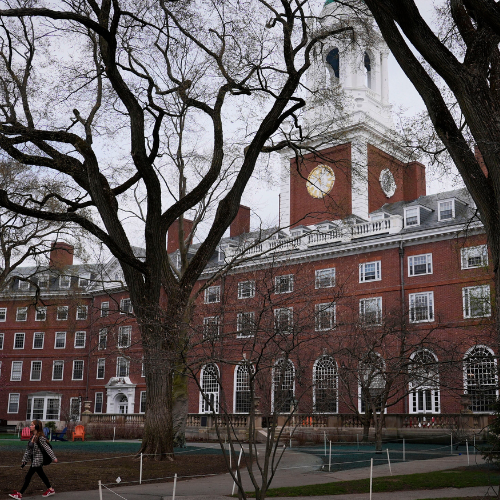Harvard University, one of the world’s most prestigious schools, is now facing heavy criticism after it was revealed that it provided training to officials from a Chinese paramilitary group known for serious human rights violations. This group, called the Xinjiang Production and Construction Corps (XPCC), has been accused of helping run detention centers and forced labor programs in China’s Xinjiang region, where many Uyghur Muslims live.
According to reports, members of the XPCC attended executive training programs at Harvard’s T.H. Chan School of Public Health in both 2023 and 2024. These programs were focused on public health policy and health insurance governance and were organized in collaboration with China’s National Healthcare Security Administration.
However, the issue has sparked outrage because the XPCC is not just an ordinary government body. In July 2020, the U.S. government placed sanctions on the XPCC under the Global Magnitsky Act. This law targets foreign groups involved in serious human rights abuses and bans U.S. individuals and organizations from working with them. Harvard’s decision to train XPCC officials has led critics to accuse the university of ignoring these sanctions and indirectly supporting a system involved in what the U.S. has called genocide against Uyghurs.
Fallout from Gaza Protests: DHS Escalates Immigration, Funding Scrutiny at Harvard
The Dark Role of XPCC in Xinjiang
The XPCC, also known by its Chinese nickname “Bingtuan,” is not a simple farming or administrative organization. It operates like a mix between a business empire and a military force. The group controls large farms, factories, and businesses in Xinjiang. It even has its own police force, courts, and media outlets. U.S. officials say that the XPCC plays a key role in China’s campaign against the Uyghur people, a mostly Muslim ethnic group living in the far western part of the country.
Since around 2017, reports have claimed that up to 1.8 million Uyghurs have been detained in what China calls “re-education” camps. Former detainees and human rights organizations say these camps involve forced labor, political indoctrination, and abuse. The XPCC has been identified as helping to run these detention centers and manage forced labor programs, making it a central player in these alleged crimes.
Because of its role, the XPCC was sanctioned by the U.S. Treasury Department, meaning American people and institutions are generally forbidden from doing business with it. Despite this, officials from the XPCC attended Harvard’s programs, raising serious concerns about whether the university has violated U.S. law or ethical standards.
Ivy Battle! Trump’s $2.2B Slap Leaves Harvard Reeling Over ‘Un-American’ Actions
Critics Warn of Legitimizing Human Rights Violators
The backlash against Harvard has been swift and strong. Uyghur human rights advocates say that by providing training to XPCC officials, Harvard is giving legitimacy to a group accused of participating in the oppression and abuse of an entire ethnic group. They argue that this kind of partnership makes it harder to hold human rights violators accountable and risks normalizing their actions on the global stage.
While China denies all allegations of abuse in Xinjiang, claiming that the XPCC is a force for economic development and national security, international organizations and multiple governments have documented widespread repression in the region. These include mass detentions, forced separations of families, surveillance, and forced labor in factories and farms controlled by groups like the XPCC.
Adding to the controversy is the fact that the XPCC manages a sprawling economic network, including 16 publicly traded companies and thousands of businesses, giving it immense power in Xinjiang and beyond. Critics warn that allowing such an entity to receive training from a respected institution like Harvard could send the wrong message at a time when global attention is focused on ending human rights abuses.
As the story continues to unfold, Harvard is now under intense scrutiny from human rights organizations, legal experts, and the public, who are demanding answers about how such training programs were approved in the first place, especially given the clear U.S. sanctions in place against the XPCC.


